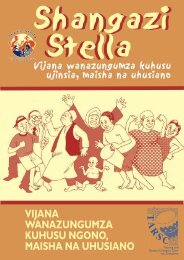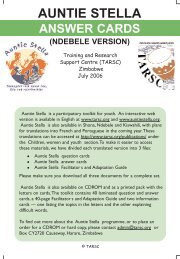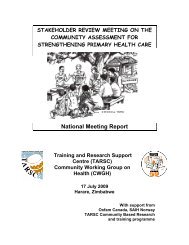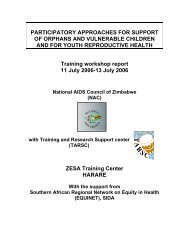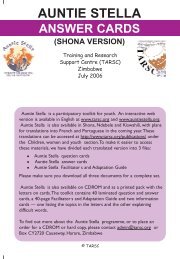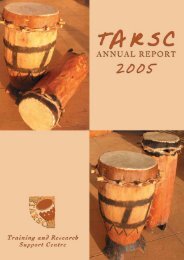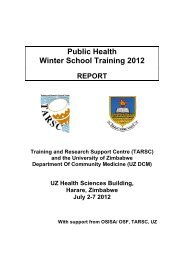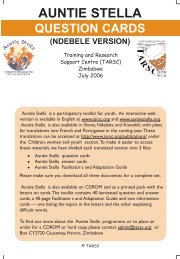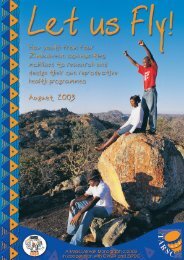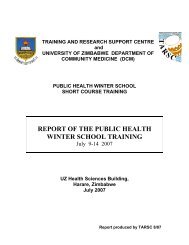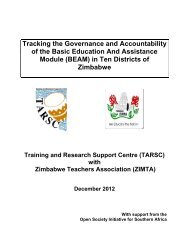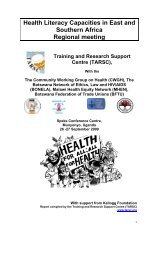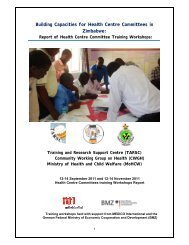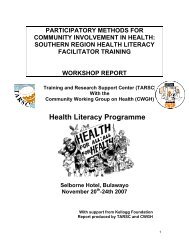WS10 Report.pdf - Training and Research Support Centre
WS10 Report.pdf - Training and Research Support Centre
WS10 Report.pdf - Training and Research Support Centre
You also want an ePaper? Increase the reach of your titles
YUMPU automatically turns print PDFs into web optimized ePapers that Google loves.
Executive Summary<br />
The <strong>Training</strong> <strong>and</strong> <strong>Research</strong> <strong>Support</strong> <strong>Centre</strong> (TARSC) <strong>and</strong> the University of Zimbabwe,<br />
Department of Community Medicine (UZ-DCM) held the sixth Public Health Winter School<br />
short course-training programme at UZ Health Sciences Building from the 5 th -10 th July 2010.<br />
The structure <strong>and</strong> content of the course was based on the findings from a needs <strong>and</strong><br />
capacity assessment carried out by the two institutions in 2005 <strong>and</strong> the feedback from the<br />
July 2009 Winter School course. The course has been run annually since 2010.<br />
The programme was aimed at building capacities for people working particularly at district<br />
level in health-related work, but who may not have had the benefit of formal training in<br />
health. The course included people from government, social security sector, workers<br />
representatives, health related civil society <strong>and</strong> researchers working at community level. The<br />
course aimed to build an underst<strong>and</strong>ing of public health <strong>and</strong> of health systems, particularly<br />
at district level. The course covered<br />
• Principles of public health , epidemiology <strong>and</strong> gender <strong>and</strong> reproductive health issues.<br />
• Major public health issues, including HIV <strong>and</strong> AIDS, TB, Malaria, nutrition, major non<br />
communicable diseases; hypertension, diabetes <strong>and</strong> mental health.<br />
• Elements of health systems, health financing, <strong>and</strong> human resources for health.<br />
• Zimbabwe’s health services at national, district <strong>and</strong> primary healthy care level<br />
• Community <strong>and</strong> non health sector roles in health.<br />
An open invitation was made for applicants on the TARSC website, in media <strong>and</strong> on<br />
institutional notice boards <strong>and</strong> of the pool of 85 applicants a total of 33 participants were<br />
selected attended the course, with the selection process aiming for relevance to work,<br />
gender <strong>and</strong> geographical equity <strong>and</strong> a spread of organizations <strong>and</strong> disciplines. Participants<br />
included district level officers from various government ministries, non governmental<br />
organisations, civil society <strong>and</strong> research organisations working on HIV <strong>and</strong> AIDS <strong>and</strong><br />
nutrition programmes <strong>and</strong> workers’ representatives. Participants came from or worked in<br />
various districts across the country.<br />
The resource persons <strong>and</strong> facilitators for the course came from the University of Zimbabwe,<br />
<strong>Training</strong> <strong>and</strong> <strong>Research</strong> <strong>Support</strong> <strong>Centre</strong>, Ministry of Health <strong>and</strong> Child Welfare, Zimbabwe<br />
Health Services Board (ZHSB), Non governmental organisations <strong>and</strong> United Nations<br />
agencies (Community Working Group on Health (CWGH), Elizabeth Glazier Foundation,<br />
UNFPA, UNICEF), Local government, Parliament of Zimbabwe <strong>and</strong> City of Zimbabwe <strong>and</strong><br />
Harare City Health Department. Sessions were accompanied by h<strong>and</strong>outs <strong>and</strong> course<br />
materials. Two assignments were done by the students in groups to test their public health<br />
<strong>and</strong> health systems knowledge. An end of course test was completed <strong>and</strong> all students<br />
passed.<br />
Students completed a course evaluation form at the end of the training to give feedback on<br />
the strengths <strong>and</strong> weaknesses of the training. The evaluation indicated that students found<br />
the course relevant to their work <strong>and</strong> the course useful. Students rated trainers <strong>and</strong><br />
materials as good. The majority of students understood the lectures, <strong>and</strong> found the<br />
h<strong>and</strong>outs <strong>and</strong> assignments clear <strong>and</strong> appreciated the Zimbabwe relevant content. For future<br />
courses students proposed the inclusion of various other topics not covered.<br />
The Dean of the School of Medicine Prof MM Chidzonga gave closing remarks <strong>and</strong> awarded<br />
certificates of completion to students, marking the end of the course.<br />
2



